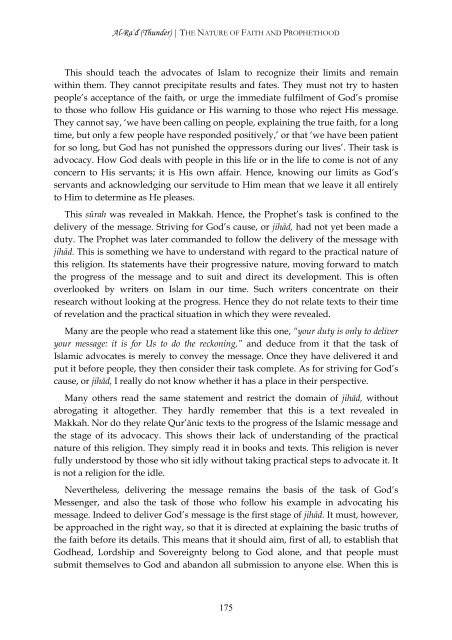Volume 10 Surah 12 - 15 - Enjoy Islam
Volume 10 Surah 12 - 15 - Enjoy Islam
Volume 10 Surah 12 - 15 - Enjoy Islam
You also want an ePaper? Increase the reach of your titles
YUMPU automatically turns print PDFs into web optimized ePapers that Google loves.
Al-Ra`đ (Thunder) | THE NATURE OF FAITH AND PROPHETHOOD<br />
This should teach the advocates of <strong>Islam</strong> to recognize their limits and remain<br />
within them. They cannot precipitate results and fates. They must not try to hasten<br />
people’s acceptance of the faith, or urge the immediate fulfilment of God’s promise<br />
to those who follow His guidance or His warning to those who reject His message.<br />
They cannot say, ‘we have been calling on people, explaining the true faith, for a long<br />
time, but only a few people have responded positively,’ or that ‘we have been patient<br />
for so long, but God has not punished the oppressors during our lives’. Their task is<br />
advocacy. How God deals with people in this life or in the life to come is not of any<br />
concern to His servants; it is His own affair. Hence, knowing our limits as God’s<br />
servants and acknowledging our servitude to Him mean that we leave it all entirely<br />
to Him to determine as He pleases.<br />
This sūrah was revealed in Makkah. Hence, the Prophet’s task is confined to the<br />
delivery of the message. Striving for God’s cause, or jihād, had not yet been made a<br />
duty. The Prophet was later commanded to follow the delivery of the message with<br />
jihād. This is something we have to understand with regard to the practical nature of<br />
this religion. Its statements have their progressive nature, moving forward to match<br />
the progress of the message and to suit and direct its development. This is often<br />
overlooked by writers on <strong>Islam</strong> in our time. Such writers concentrate on their<br />
research without looking at the progress. Hence they do not relate texts to their time<br />
of revelation and the practical situation in which they were revealed.<br />
Many are the people who read a statement like this one, “your duty is only to deliver<br />
your message: it is for Us to do the reckoning,” and deduce from it that the task of<br />
<strong>Islam</strong>ic advocates is merely to convey the message. Once they have delivered it and<br />
put it before people, they then consider their task complete. As for striving for God’s<br />
cause, or jihād, I really do not know whether it has a place in their perspective.<br />
Many others read the same statement and restrict the domain of jihād, without<br />
abrogating it altogether. They hardly remember that this is a text revealed in<br />
Makkah. Nor do they relate Qur’ānic texts to the progress of the <strong>Islam</strong>ic message and<br />
the stage of its advocacy. This shows their lack of understanding of the practical<br />
nature of this religion. They simply read it in books and texts. This religion is never<br />
fully understood by those who sit idly without taking practical steps to advocate it. It<br />
is not a religion for the idle.<br />
Nevertheless, delivering the message remains the basis of the task of God’s<br />
Messenger, and also the task of those who follow his example in advocating his<br />
message. Indeed to deliver God’s message is the first stage of jihād. It must, however,<br />
be approached in the right way, so that it is directed at explaining the basic truths of<br />
the faith before its details. This means that it should aim, first of all, to establish that<br />
Godhead, Lordship and Sovereignty belong to God alone, and that people must<br />
submit themselves to God and abandon all submission to anyone else. When this is<br />
175

















